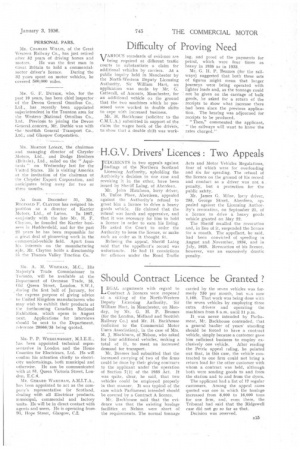Should Contract Licence be Granted ?
Page 25

If you've noticed an error in this article please click here to report it so we can fix it.
LEGAL arguments with regard to Contract A licences were reopened at a sitting of the North-Western Deputy Licensing Authority, Sir William Hart, in Manchester, on Monday, by Mr. G. H. P. Beames (for the London, Midland and Scottish Railway Co.) and Mr. H. Backhouse (solicitor to the Commercial Motor Users Association), in the case of Mrs. M. J. Blackburn, of Nelson, who asked for four additional vehicles, making a total of 11, to meet an increased demand for transport.
Mr. Beames had submitted that the increased carrying of two of the firms could be done by their giving contracts to the applicant under the operation of Section 7(1) of the 1933 Act. It was quite, clear, he said, that two vehicles could be employed properly in that manner. It was typical of the case which Parliament intended should be covered by a Contract A licence.
Mr. Backhouse said that the evidence was that the existing haulage facilities at Notion were short of the requirements. The normal tonnage
carried by the seven vehicles was formerly 750 per month, but w,-,s now 1,160. That work was being done with the seven vehicles by employing three extra drivers and operating the machines from 5 a.m. until 11 p.m.
It was never intended by Parliament, Mr. Backhouse contended, that a general haulier of years' standing should be forced to have a contract vehicle, simply because a customer gave him sufficient business to employ ex clusively one vehicle. After reading the Petrie appeal ruling, he pointed out that, in this case, the vehicle contracted to one firm could not bring a return load for the other customer with whom a contract was held, although both were sending goods to and from the station and to and from the dyers.
The applicant had a list of 17 regular customers. Among the appeal cases quoted was one in which the haulage increased from 8,000 to 16,000 tons for one firm, and, even there, the Tribunal had said that the Ridgewell case did not go so far as that.
Decision was reserved,




















































































